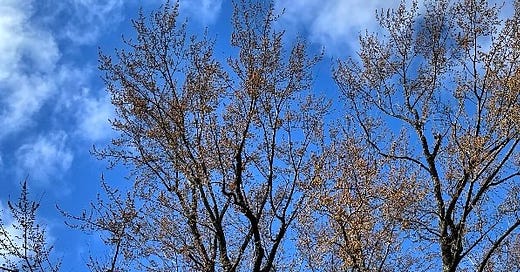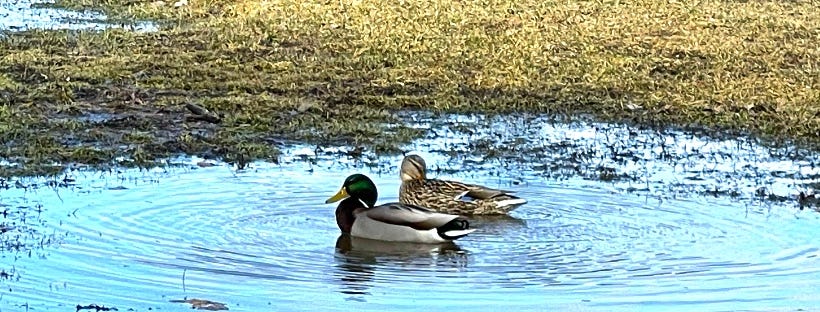In today's edition of The Planet: worrying news on deforestation, the launch of a new initiative, Big Bird conservation in India, bees on the move, why I will keep writing, and some pictures.
1. Deforestation
It is hard to imagine the extent of last year's tree cover loss in the tropics; 12 million hectares, about 12 million baseball fields, or three times the Netherlands. About a third of this area concerns primary tropical forests. These previously undisturbed old-growth forests are essential for the planet. Ecosystems with trees of hundreds, even thousands of years old, store more carbon and are much more biodiverse than younger or replanted forests. More than a billion people depend on the forest for their livelihoods. The world bank estimates that this includes roughly a quarter of the world's poor, while 90% of the poorest depend substantially on forests.
The World Resources Institute notes that despite the worldwide economic downturn due to covid, tree loss in primary tropical forests increased by 12 percent compared to 2019. The pandemic measures may have limited the capability of officials to protect the forest. The situation may worsen if cash-strapped governments decide to go for the short-term gain of lifting environmental protection rules. Conserving and restoring forests is a much better long-term strategy from an ecological and economic point of view. UNDP estimates that stopping deforestation and restoring degraded forests provides around a third of the carbon reduction needed to avoid climate change's most severe impacts. Preserving forests also keeps us safe from new diseases; about a third of all outbreaks of new and emerging diseases are linked to deforestation and other land-use changes.
It was a cold day in Ottawa, and most trees don't show any signs of spring activity yet. But then I found this tree bursting to life, in a truly Canadian spirit, never minding the cold and just pretending that it was a warm day in April.
2. Combining environmental sustainability with digital transformation.
Yesterday, I joined the launch of the CODES initiative that brings together public and private sector stakeholders with civil society who work on the nexus of environmental sustainability and digital transformation. This new initiative will coordinate efforts and share lessons learned. It will also mobilize resources and political commitments for action. Click here for more information.
3. Greater Adjutants in Assam
I enjoyed reading Carla Rhodes' article in the New York Times about her trip to Assam, India, where she came to look for the endangered giant storks, known as greater adjutants. IUCN estimates that there are only about 800 to 1,200 mature ones left in existence, spread over three regions. An all-female grassroots volunteer corps tries to save the biggest of these declining populations. You can read the article and see her beautiful pictures here. This magnificent bird with a wingspan of up to 250 cm has an almost prehistoric appearance. I guess you might say that shows the birds' 19,7 million years of evolution.
The birds that I saw today: ducks in love, happily swimming on a puddle of meltwater.
4. Bee careful
A man in New Mexico left his car window down while shopping and returned to find 15,000 bees. If this ever happens to you, try to lure them away with an empty beehive and add some lemongrass oil to mimic the smell of a queen; it sounds easy. Here is the story.
5. More writing in Ontario
Since I arrived in Ottawa last November, I have lived here through different versions of lockdowns. I remember orange, red, and if I followed it correctly, recently a lighter form of red. But today, Ontario had to pull the "emergency brake." On Saturday, a shutdown will begin. Despite all the measures and, from my limited perspective in Ottawa, general adherence by the public to the government's health measures like wearing masks, Ontario faces a surge in ICU admissions. A trend made much worse because of the variants on the coronavirus. Doug Ford, the Ontario Prime Minister, said: "This is a new pandemic; we are fighting a new enemy." I will mostly have to stay at home, so you may expect the Planet newsletter's high frequency to continue in April.
That's it for today. I like it when you made it to the end. If you know someone who wants to receive these newsletters about the planet, please share this copy with them. This initiative only works if enough people subscribe.







I read about those bees a couple days ago,. I could probably find lemongrass oil but not sure where I would find a beehive 😂.
Another lockdown for you, that really sucks. We opened fully a couple weeks ago, I hope everything goes well. I received my first vaccine Wednesday. I didn't really have any side affects just the sore arm which wasn't that bad.
Another interesting and informative issue. The article on the storks was especially relevant since we are losing birds of all kinds. Women and children seem to be on the forefront of saving these storks and using that strategy works for other species as well. Jack Kinross, a conservationist in Nepal, uses it to protect the wildlife there.
Seems garbage is another issue that needs to be addressed by everyone. Wishing you a joyful Easter.